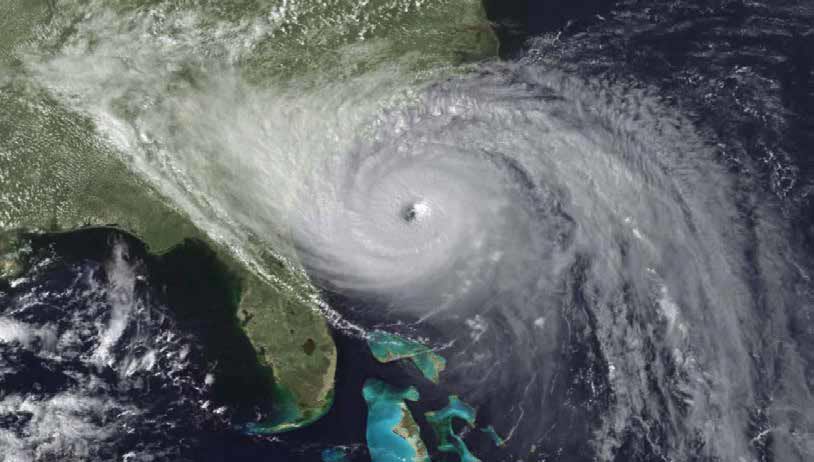
Editor’s Note: As hurricane season is upon us again, we remember Hurricane Hugo and the destruction it brought. Below is a story about Sullivan’s Island resident and police sergeant David Price, who shared how the storm affected him and his family. This article was originally in Hurricane Hugo Magazine, which was produced by the publisher of Sullivan’s Island Magazine in 1989.
If Sullivan’s Island Police Sgt. David J. Price could erase a period of his life, he would most certainly eliminate the last two weeks of September and the first two weeks of October 1989.
During those four weeks, Price lost 99 percent of his worldly possessions, protected a devastated jurisdiction, shared the grief and sorrow of his fellow residents on Sullivan’s
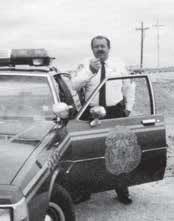
Sullivan’s Island Police Department for
four years when Hurricane Hugo hit.
Island and worried about the well-being of his estranged wife and three children, who lived in the San Francisco Bay area.
Another man would have said, “Enough is enough.” Price didn’t.
“I’m not hunting for any glory,” he said during a routine patrol of Sullivan’s Island. “I’m just an ordinary person who, like many others, lost everything during the hurricane.”
The destructive powers of Hurricane Hugo, which struck the Charleston area on the night of Sept. 21, were initially underrated by many locals, including Price.
“This was my second hurricane. I rode one out when I lived in Hawaii back in ’79, but it wasn’t as powerful as Hugo. I underestimated what it would do, but I guess we all did,” he said matter-of-factly.
The son of a minister, Price lived in a number of states throughout the country. He came to the Sullivan’s Island Police Department after a two-year stint with the Estill Department. A member of the Sullivan’s Island force for four years, he was the only one of the five officers who lived on the island at the time.
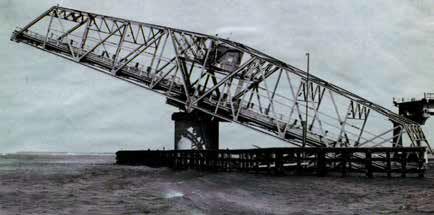
“We had a hurricane tracking map on the office wall, and we didn’t use it for show. We had been pinpointing it (Hugo) and followed it closely on the news. But, on Wednesday (Sept. 20), we got the word from the Emergency Preparedness officials to evacuate the island.”
“My immediate thoughts were of long traffic lines, the people who had been here for many years and would be forced to evacuate and folks who couldn’t leave. I knew we would have problems,” he added “We went through the streets and used the loudspeakers to say: ‘Mandatory evacuation; leave immediately.’ I must have said that a million times.”
“There were several senior citizens I knew that could not get off the island by themselves, so I went and helped them move to the Moultrie Middle School shelter. I was really concerned about getting them to safety,” he said.
Thursday morning, Price and his fellow officers were positioned by the Ben Sawyer Bridge, informing travelers that they would not be allowed on the island. He later patrolled the area and convinced local surfers to depart the Station 22 beach, which was enjoying Hugo’s lone benefit – great waves for surfing. During his rounds, Price occasionally stopped by his apartment on Station 20 to pack several things into the trunk of his police car. He knew he wouldn’t be spending the night in the comfort of his home.
“We had plans to stay in the police station as long as possible (Thursday night) and then move into the I’ On Avenue bunkers. When the chief (Jack Lillienthal) and I saw the wind lift a truck and then heard there was the possibility of a 30-foot surge, we left for Mount Pleasant. By midnight, we were on the causeway after crossing a shaking bridge, but we couldn’t see in front of us. It was hard to keep the vehicle on the road. Chief made us wear life vests before we left the island. At first I thought it was silly, but I was glad we did. It was a great decision.”
Price stayed with friends in Mount Pleasant but recalled that he still couldn’t relax. The ripping sound of the wind, the cracking of trees and the scratching of the roof shingles kept him wide awake, and he later went outside during the calm of the hurricane’s eye. He could see stars, but quickly returned inside when the wind began to pick back up.
Later, although it was still dark, Price made an attempt to return to the island. Boats, debris and fallen telephone poles blocked his path on the causeway, but he eventually got as far as Toller’s Cove. Price said he was “in a state of shock” when he witnessed the Ben Sawyer Bridge dangling in the Intracoastal Waterway.
Several island officials were the first to take a boat to the island.
“Chief and the fire chief were in the first boat, and I’ll always remember them telling me, ‘You won’t believe this. It’s something.’ I began to think of how long it would take for the island to recover – how the senior citizens would manage and if most residents would pack up and leave.
“Late Friday afternoon, I went to look at my apartment. I was actually scared to open the door. My hand was shaking, and I couldn’t get my key in the door. I had to force the door to get it open. Then I saw it. I was dumbstruck. I saw everything turned over and mud everywhere. It was a hollow feeling to see all your possessions ruined. All of the rooms were trashed.
“I had a footlocker with photos of the kids and my paperwork in it. I walked over to it and hesitated before opening. After I lifted the top and saw it was full of water, I began to cry. I literally bawled like a baby. It was bad enough to have lost my furniture, but to have lost those photos nearly killed me. I immediately left and couldn’t go back in there. I was glad to have my work to get my mind off what I had lost,” he admitted.
Price was responsible for helping to keep people off the island. Although there were no problems with looters, the police did have to contend with scavengers. Price exterminated four copperhead snakes in one day, using “Old Betsy” (as he calls his pistol) and ran another one over with his car.
He added that the National Guard did an excellent job and assisted area law enforcement personnel. He was grateful for the Guard’s around-the-clock work.
By Tuesday, Sept. 26, officials began to allow residents to return to the island on ferries from Shem Creek.
“I knew people would be frustrated, but many folks were cheerful and polite. I think they were genuinely happy to be back, and I’m sure many were hiding their actual fears. I just listened to them. Even if they complained, I just listened. Sometimes listening is the best medicine, and it was this time,” he said. “In most cases, I could relate to what they were going through since I just went through it myself.”
Price came to grips with his personal losses and tried not to think about them. Instead, he concentrated on his work.
“It’s just a job. I didn’t do anything heroic,” he said of his days following the hurricane. “I just did what I was supposed to do.”


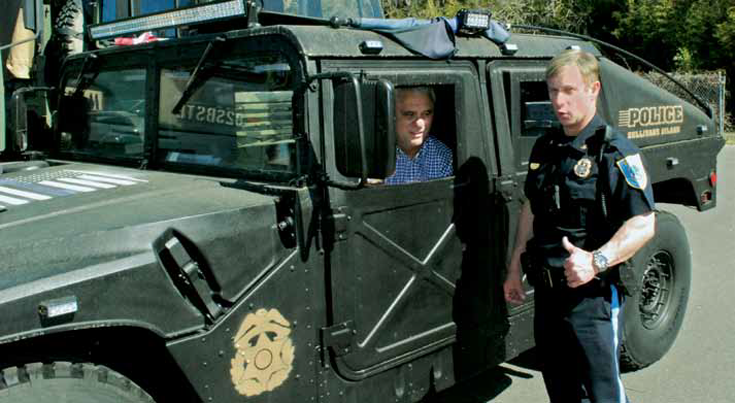

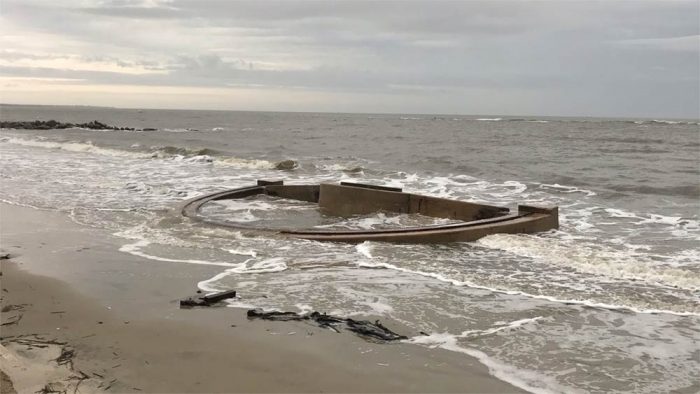
Leave a Reply